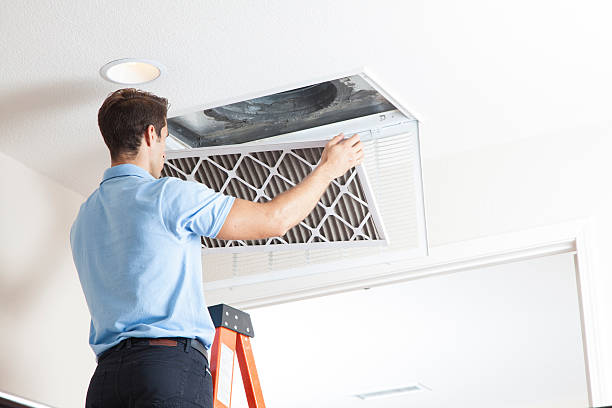Maintaining a comfortable and healthy home environment is a priority for homeowners, and your HVAC (Heating, Ventilation, and Air Conditioning) system plays a critical role in achieving this. One often overlooked but essential component of your HVAC system is the air filter. Regularly changing your HVAC filter is crucial for the efficiency of your system, the quality of your indoor air, and your overall energy costs. However, knowing exactly when to change your HVAC filter can be confusing. This comprehensive guide will help you understand the signs that indicate it’s time for a change, the factors affecting filter lifespan, and the best practices for maintaining your HVAC system, including routine HVAC maintenance.
Understanding HVAC Filters
Before diving into when to change your HVAC filter, it’s important to understand what these filters do. HVAC filters are designed to trap dust, pollen, pet dander, and other airborne particles, preventing them from circulating through your home. They also protect the internal components of your HVAC system from dust and debris, ensuring smooth operation.
Types of HVAC Filters
HVAC filters come in various types, each with its own lifespan and efficiency:
- Fiberglass Filters: These are the most basic and least expensive option. They typically need to be replaced every 30 days.
- Pleated Filters: Made from polyester or cotton, these filters are more efficient at trapping particles and generally last up to 90 days.
- High-Efficiency Particulate Air (HEPA) Filters: These filters are designed to trap very small particles and can last anywhere from 6 months to a year.
- Electrostatic Filters: These use static electricity to attract and trap particles. They can last up to 90 days but can sometimes be cleaned and reused.
- Reusable Filters: Made from durable materials, these filters can be washed and reused, often lasting several years with proper maintenance.
Factors Affecting Filter Lifespan
The lifespan of your HVAC filter can vary depending on several factors:
- Home Size and Occupancy: Larger homes with more occupants tend to accumulate dust and debris faster, requiring more frequent filter changes.
- Pets: Homes with pets, especially those that shed, will need more frequent filter changes due to increased hair and dander.
- Allergies and Respiratory Issues: If anyone in your home suffers from allergies or respiratory issues, you may need to change your filter more often to maintain better air quality.
- Indoor Air Quality: Homes in areas with high pollution or those that use fireplaces or wood-burning stoves may need more frequent filter changes.
- Filter Type: As mentioned earlier, the type of filter you use will significantly impact how often it needs to be changed.
Signs It’s Time to Change Your HVAC Filter
While the general guidelines provided by filter manufacturers are helpful, there are specific signs that indicate your HVAC filter needs to be changed:
- Visible Dirt and Debris: If you can see a buildup of dust and debris on the filter, it’s time for a change.
- Increased Allergy Symptoms: If you or your family members are experiencing more frequent allergy symptoms, it could be due to a dirty filter.
- Higher Energy Bills: A clogged filter forces your HVAC system to work harder, increasing energy consumption and your utility bills.
- Poor Airflow: If you notice weak airflow from your vents, a dirty filter could be restricting air movement.
- Dust Accumulation: If you see more dust settling on surfaces around your home, it might be due to a dirty filter.
- System Overheating: An HVAC system that overheats and shuts off frequently could be a sign of restricted airflow caused by a dirty filter.
Best Practices for Changing Your HVAC Filter
To ensure your HVAC system operates efficiently and maintains good air quality, follow these best practices for changing your filter:
- Regular Inspection: Check your filter at least once a month, even if you don’t need to change it that frequently.
- Follow Manufacturer Recommendations: Adhere to the guidelines provided by the filter manufacturer regarding replacement frequency.
- Use the Right Filter: Make sure you are using the correct filter size and type for your HVAC system.
- Mark Your Calendar: Set a reminder to check and change your filter regularly.
- Consider Upgrading: If you find that your filter needs frequent changes, consider upgrading to a higher-quality filter that can last longer and provide better air filtration.
Steps to Change Your HVAC Filter
Changing your HVAC filter is a simple task that you can do yourself. Here’s a step-by-step guide:
- Turn Off Your HVAC System: Before changing the filter, make sure to turn off the system to prevent dust and debris from circulating.
- Locate the Filter: The filter is usually located in the return air duct or the blower compartment of your HVAC unit.
- Remove the Old Filter: Carefully remove the old filter, taking note of the direction of airflow indicated on the filter.
- Insert the New Filter: Place the new filter in the slot, ensuring it is oriented correctly according to the airflow direction.
- Secure the Filter: Make sure the filter is properly secured in place.
- Turn On Your HVAC System: Once the new filter is in place, turn your system back on.
Benefits of Regular HVAC Filter Changes
Regularly changing your HVAC filter offers several benefits:
- Improved Air Quality: Clean filters trap more dust, pollen, and other particles, resulting in cleaner air.
- Enhanced System Efficiency: A clean filter allows your HVAC system to operate more efficiently, reducing energy consumption.
- Extended System Lifespan: Keeping your system free from dust and debris reduces wear and tear, extending its lifespan.
- Lower Energy Bills: An efficient HVAC system consumes less energy, lowering your utility bills.
- Reduced Allergies and Respiratory Issues: Cleaner air can alleviate allergy symptoms and improve respiratory health.
Common Myths About HVAC Filters
There are several myths surrounding HVAC filters that can lead to confusion:
- Myth: Thicker Filters Are Always Better: While thicker filters can trap more particles, they can also restrict airflow if not compatible with your system.
- Myth: All Filters Are the Same: Different filters have different efficiencies and lifespans. Choosing the right filter for your needs is essential.
- Myth: Changing Filters Is a Waste of Money: Regular filter changes are an investment in the efficiency of your HVAC system and the quality of your indoor air.
- Myth: You Only Need to Change Filters Once a Year: Depending on various factors, filters may need to be changed more frequently than once a year.
Conclusion
Maintaining a healthy and efficient home environment is closely tied to the condition of your HVAC system, and the air filter plays a pivotal role in this. Knowing when to change your HVAC filter and adhering to a regular maintenance schedule can significantly improve your indoor air quality, reduce energy costs, and extend the lifespan of your HVAC system. By understanding the factors that affect filter lifespan, recognizing the signs of a dirty filter, and following best practices for filter maintenance, you can ensure that your HVAC system operates at its best year-round. Regular attention to this simple yet crucial component of your HVAC system will pay off in terms of comfort, health, and savings. When considering upgrades or replacements for your HVAC system, remember to reach out for an HVAC quote to plan your budget effectively and make informed decisions.





